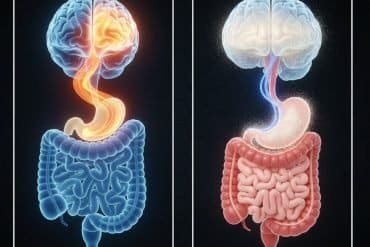Summary: New research reveals that the cognitive boost from moderate to vigorous exercise lasts up to the next day, enhancing memory performance in adults aged 50 to 83. The study also found that adequate sleep—particularly deep, slow-wave sleep—adds to these benefits.
Conversely, prolonged sedentary time was linked to poorer working memory the following day. These findings highlight the importance of daily physical activity and quality sleep for maintaining cognitive health, especially in older adults.
Key Facts:
- Extended Cognitive Boost: Moderate to vigorous exercise improves memory for up to 24 hours.
- Sleep Synergy: Deep sleep enhances the memory benefits of exercise.
- Sedentary Impact: Increased sedentary behavior negatively affects next-day working memory.
Source: UCL
The short-term boost our brains get after we do exercise persists throughout the following day, suggests a new study led by UCL (University College London) researchers.
Previous research in a laboratory setting has shown that people’s cognitive performance improves in the hours after exercise, but how long this benefit lasts is unknown.
Video credit: Neuroscience News
The new study, published in the International Journal of Behavioral Nutrition and Physical Activity, found that, on average, people aged 50 to 83 who did more moderate to vigorous physical activity than usual on a given day did better in memory tests the day after.
Less time spent sitting and six hours or more of sleep were also linked to better scores in memory tests the next day.
More deep (slow-wave*) sleep also contributed to memory function, and the research team found this accounted for a small portion of the link between exercise and better next-day memory.
The research team looked at data from 76 men and women who wore activity trackers for eight days and took cognitive tests each day.
Lead author Dr Mikaela Bloomberg (UCL Institute of Epidemiology & Health Care) said: “Our findings suggest that the short-term memory benefits of physical activity may last longer than previously thought, possibly to the next day instead of just the few hours after exercise. Getting more sleep, particularly deep sleep, seems to add to this memory improvement.
“Moderate or vigorous activity means anything that gets your heart rate up – this could be brisk walking, dancing or walking up a few flights of stairs. It doesn’t have to be structured exercise.
“This was a small study and so it needs to be replicated with a larger sample of participants before we can be certain about the results.”
In the short term, exercise increases blood flow to the brain and stimulates the release of neurotransmitters such as norepinephrine and dopamine which help a range of cognitive functions.
These neurochemical changes are understood to last up to a few hours after exercise. However, the researchers noted that other brain states linked to exercise were more long-lasting. For instance, evidence suggests exercise can enhance mood for up to 24 hours.

A previous study, published by a separate research team in 2016, also found more synchronised activity in the hippocampus (a marker of increased hippocampal function, which facilitates memory function) for 48 hours after high-intensity interval training (HIIT) cycling.
Co-author Professor Andrew Steptoe (UCL Institute of Epidemiology & Health Care) said: “Among older adults, maintaining cognitive function is important for good quality of life, wellbeing, and independence. It’s therefore helpful to identify factors that can affect cognitive health on a day-to-day basis.
“This study provides evidence that the immediate cognitive benefits of exercise may last longer than we thought. It also suggests good sleep quality separately contributes to cognitive performance.
“However, we can’t establish from this study whether these short-term boosts to cognitive performance contribute to longer term cognitive health and though there is plenty of evidence to suggest physical activity might slow cognitive decline and reduce dementia risk, it’s still a matter of some debate.”
For the new study, the researchers looked at data from wrist-worn activity trackers to determine how much time participants spent being sedentary, doing light physical activity, and doing moderate or vigorous physical activity.
They also quantified sleep duration and time spent in lighter (rapid eye movement, or REM) sleep and deeper, slow-wave sleep.
In looking at the links between different types of activity and next-day cognitive performance, the research team adjusted for a wide variety of factors that might have distorted the results, including the amount of moderate or vigorous physical activity that participants did on the day of the tests.
They also accounted for participants’ average levels of activity and sleep quality across the eight days they were tracked, as participants who are habitually more active and typically have higher-quality sleep perform better in cognitive tests.
The team found that more moderate or vigorous physical activity compared to a person’s average was linked to better working memory and episodic memory (memory of events) the next day.
More sleep overall was linked to improved episodic and working memory and psychomotor speed (a measure of how quickly a person detects and responds to the environment). More slow-wave sleep was linked to better episodic memory.
Conversely, more time spent being sedentary than usual was linked to worse working memory the next day.
The study is among the first to evaluate next-day cognitive performance using a “micro-longitudinal” study design where participants were tracked going about their normal lives rather than having to stay in a lab.
Among the study limitations, the researchers noted that the participants were a cognitively healthy group, meaning the results might not be true for people who have neurocognitive disorders.
Funding: The study involved researchers from the UCL Institute of Epidemiology & Health Care, UCL Division of Surgery & Interventional Science and the University of Oxford, and received funding from the UK’s Economic and Social Research Council (ESRC).
*Slow-wave sleep was given its name based on the characteristic brain waves that can be observed during this stage of sleep. It is deep, restorative sleep, where a person’s heart rate slows and blood pressure decreases.
About this exercise and memory research news
Author: Mark Greaves
Source: UCL
Contact: Mark Greaves – UCL
Image: The image is credited to Neuroscience News
Original Research: Open access.
“Associations of accelerometer-measured physical activity, sedentary behaviour, and sleep with next-day cognitive performance in older adults: a micro-longitudinal study” by Mikaela Bloomberg et al. International Journal of Behavioral Nutrition and Physical Activity
Abstract
Associations of accelerometer-measured physical activity, sedentary behaviour, and sleep with next-day cognitive performance in older adults: a micro-longitudinal study
Background
Previous studies suggest short-term cognitive benefits of physical activity occurring minutes to hours after exercise. Whether these benefits persist the following day and the role of sleep is unclear. We examined associations of accelerometer-assessed physical activity, sedentary behaviour, and sleep with next-day cognitive performance in older adults.
Methods
British adults aged 50-83 years (N = 76) without evidence of cognitive impairment or dementia wore accelerometers for eight days, and took daily cognitive tests of attention, memory, psychomotor speed, executive function, and processing speed.
Physical behaviour (time spent in moderate-to-vigorous physical activity [MVPA], light physical activity [LPA], and sedentary behaviour [SB]) and sleep characteristics (overnight sleep duration, time spent in rapid eye movement [REM] sleep and slow wave sleep [SWS]) were extracted from accelerometers, with sleep stages derived using a novel polysomnography-validated machine learning algorithm.
We used linear mixed models to examine associations of physical activity and sleep with next-day cognitive performance, after accounting for habitual physical activity and sleep patterns during the study period and other temporal and contextual factors.
Results
An additional 30 min of MVPA on the previous day was associated with episodic memory scores 0.15 standard deviations (SD; 95% confidence interval = 0.01 to 0.29; p = 0.03) higher and working memory scores 0.16 SD (0.03 to 0.28; p = 0.01) higher. Each 30-min increase in SB was associated with working memory scores 0.05 SD (0.00 to 0.09) lower (p = 0.03); adjustment for sleep characteristics on the previous night did not substantively change these results.
Independent of MVPA on the previous day, sleep duration ≥ 6 h (compared with < 6 h) on the previous night was associated with episodic memory scores 0.60 SD (0.16 to 1.03) higher (p = 0.008) and psychomotor speed 0.34 SD (0.04 to 0.65) faster (p = 0.03). Each 30-min increase in REM sleep on the previous night was associated with 0.13 SD (0.00 to 0.25) higher attention scores (p = 0.04); a 30-min increase in SWS was associated with 0.17 SD (0.05 to 0.29) higher episodic memory scores (p = 0.008).
Conclusions
Memory benefits of MVPA may persist for 24 h; longer sleep duration, particularly more time spent in SWS, could independently contribute to these benefits.







